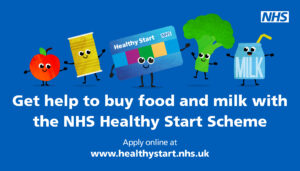Get trusted NHS advice and hear from other parents
Starting solids is a big step for you and your baby. It can feel daunting with lots of information out there. Families in Kent share their experiences alongside expert NHS advice and tips from Kent Health Visiting Teams of introducing solids. If you open the video in YouTube you can select the chapter you want to watch.
From six months, you can introduce solid food alongside your baby’s usual milk feeds. At this age, most babies can sit up unaided, pick up food, put it in their mouth and swallow it rather than pushing it out again with their tongue. Remember your baby’s tummy is tiny and fills up quickly, so offer milk feeds after food.
How much your baby takes is less important than getting them used to the idea of eating, alongside all the new tastes and textures they’ll experience. Start with small amounts as most of their calories and nutrients will still come from breast or first-stage formula milk.
Your baby has a small tummy that fills up quickly so start with small portions and offer more if they're still hungry. Allowing your child to feed themselves as soon as they are able, will allow them to eat at their own pace. The amount your baby eats depends on their appetite, which can vary from day-to-day. Some days your baby might be more interested in milk feeds and some days solid foods.
Signs an older baby is full:
- closing their mouth
- turning head away or pushing food away.
If you're breastfeeding, you can continue for as long as you and your baby want to. There's no need to stop before you're both ready. Breastfeeding still has lots of benefits for you and your baby after six months. It also continues to provide the balance of nutrients your baby needs.
Water can be introduced in a cup or ‘free-flow’ beaker from six months and alongside breast milk or formula, is the only drink they need in the first year. Start4life has expert NHS advice with simple, healthy weaning recipe and meal ideas.
If your baby was born before 37 weeks they may still be able to start solids at six months if they have caught up with their milestones but some babies may need a bit longer to be developmentally ready. Your paediatrician will be able to advise you. Bliss provides information about introducing your premature baby to solid foods. When you begin introducing solids to your baby, start with simple, unprocessed foods without salt or sugar. It’s important to take time to enjoy mealtimes with your baby. Your baby will copy you and enjoy the foods you like.
Your baby’s meals can be made from the same ingredients as homemade family meals just without any salt or sugar added to your baby’s portions. Your baby may prefer to start with a smooth puree or be ready with lumpier textures but encourage finger feeding, and expect a mess. There are just a couple of things to avoid; whole nuts, grapes or tomatoes which may be a choking hazard and honey before one. You should also avoid some mercury-rich fish such as marlin and swordfish and remember never leave your baby alone when eating.

If you’re receiving a qualifying benefit and are pregnant or have parental responsibility for at least one child under the age of 4, you can apply online for the NHS Healthy Start card. This card can be used to buy milk, fruit and vegetables, pulses, and infant formula milk. You can also get vitamin supplements.
Virtual introducing solid sessions - book now
 Join one of our health visiting-led virtual sessions to get trusted NHS advice on everything from choosing the right first foods to making mealtimes fun and safe for your little one. Sessions are available to any family in Kent.
Join one of our health visiting-led virtual sessions to get trusted NHS advice on everything from choosing the right first foods to making mealtimes fun and safe for your little one. Sessions are available to any family in Kent.
Virtual session dates - please select to book your place:
- Tuesday, 10 February, 9.30 to 11.30am
- Monday, 23 February, 1 to 3pm
- Wednesday, 11 March, 11am to 1pm
- Wednesday, 25 March, 11am to 1pm
- Monday, 13 April, 1 to 3pm
- Tuesday, 21 April, 1 to 3pm
- Thursday, 7 May, 9.30 to 11.30am
- Thursday, 21 May, 9.30 to 11.30am
- Monday, 8 June, 1 to 3pm
- Monday, 22 June, 1 to 3pm
- Monday, 13 July, 9.30 to 11.30am
- Wednesday, 22 July, 9.30 to 11.30am
- Tuesday, 4 August, 1 to 3pm
- Wednesday, 26 August, 10am to 12noon
- Thursday, 3 September, 1.30 to 3.30pm
- Wednesday, 30 September, 10am to 12noon
- Monday, 5 October, 1.30 to 3.30pm
- Thursday, 22 October, 10am to 12noon
- Wednesday, 4 November, 9.30 to 11.30am
- Wednesday, 25 November, 1 to 3pm
- Wednesday, 9 December, 10am to 12noon
- Thursday, 10 December, 1 to 3pm
Some Family Hubs offer face-to-face sessions as well, please check with your local centre to see what is available in your area.
Introducing Solids PowerPoint videos
You can also watch our ‘Introducing Solids’ PowerPoint videos which covers the topics we discuss on the virtual workshops including getting your baby started on solid foods, feeding your baby responsively, practical tips and meal ideas and eating safely and meal ideas.
Useful resources
- Start4life has expert NHS advice with simple, healthy weaning recipe and meal ideas
- Read about what to expect when introducing solids and breastfeeding at Beside You.
- Responsive feeding advice is available from UNICEF.
- The Children Dietetics Team has useful resources.
Page last reviewed: 12/14/2025, next review due: 01/01/2028